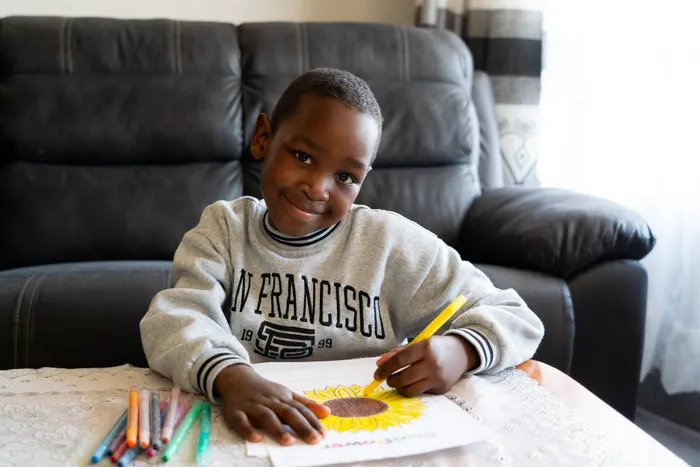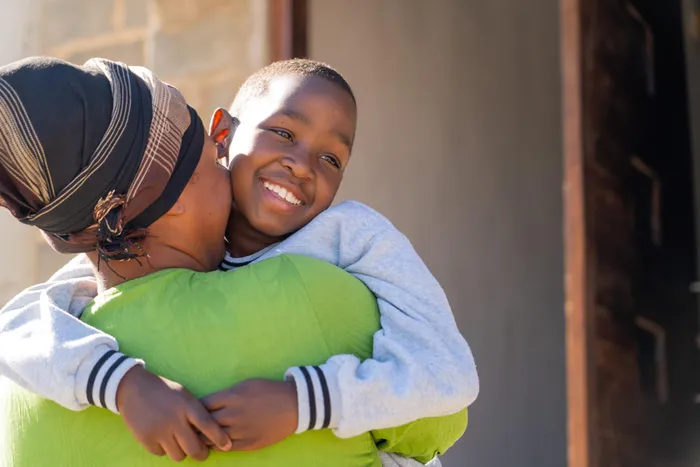Seven-year-old cancer survivor surpasses 100-day post-transplant milestone
TRANSPLANT TRIUMPH

Seven-year-old Avukile from KZN was diagnosed with an aggressive form of blood cancer, but thanks to the generosity of a stranger, a match was found, and Avukile received a second chance at life.
Image: Supplied / DKMS
Sunflower Day on September 19 each year, hosted by DKMS Africa, is an annual awareness and fund-raising campaign to support patients with blood cancers and disorders like leukaemia.
If you're interested to know what awareness and fund-raising is good for, consider Avukile, a seven-year-old from Estcourt, KwaZulu-Natal, who has passed a critical milestone on his road to recovery from Acute Lymphoblastic Leukaemia (ALL).
Just over three months ago, Avukile underwent a stem cell transplant, the only way to restore normal blood production, after his diagnosis with the aggressive cancer of the blood and bone marrow.
Thanks to a selfless donor, he has now surpassed the 100-day post-transplant mark.
Avukile's journey began in June 2023 when his energy levels dropped and he lost his appetite. After several medical consultations and tests, he was diagnosed with ALL in early 2024. His mother, Thobile, was told Avukile needed a stem cell transplant from a matching donor.

Avukile and his mother Thobile.
Image: Supplied / DKMS
"A few months later, I got a call from the doctors saying they had found a match. But the excitement quickly turned to disappointment. They said the donor could only donate in two or three years' time due to unforeseen circumstances.
"I was devastated," Thobile said.
In February this year, a new donor was found, and Avukile received the transplant. "Everything moved so fast," Thobile says.
"The first 100 days post-transplant are the most high-risk," explains Palesa Mokomele, Head of Community Engagement and Communication at DKMS Africa. "It's after a transplant that patients are most vulnerable to complications such as infection and graft-versus-host disease, which occurs when the new cells from the donor mistake the patient's body for something harmful and begin attacking it.
"Surpassing day 100 signals that the transplant has been accepted by the body and that the child is entering a much more stable phase of healing."
A decade-long study found 89% of children who received matched-donor transplants survived their procedures.
"In South Africa, blood cancers represent 33% of all childhood cancer cases, affecting over 1,400 children annually," says Mokomele. "Many of these young patients, along with others suffering from blood disorders, will require a stem cell transplant to survive ... However, finding a matching stem cell donor can take months, sometimes even years, and unfortunately, some patients may never find a suitable match at all."
Significantly better odds
"Although a patient's relatives are the first to be considered as potential donors, only about 30% find a related match. When a related match can't be found, the search then shifts to unrelated donors on the local stem cell registry," Mokomele highlights. "Our national donor registry does not yet reflect the full diversity of our population. With over 17,000 known tissue types that combine in millions of ways across different ethnic groups, patients of Black, Coloured, and Asian descent face especially slim chances of finding a match.
"This is why every new person who registers significantly improves the odds of saving a life."
"The Lord must bless them and their family. May their wishes be granted. They must continue encouraging others to donate and show how impactful it is to help children like my son," Thobile says of the donor.
"When a child is diagnosed with blood cancer or a blood disorder, their family is thrown into a world of fear and uncertainty. But stories like Avukile's prove that behind every transplant is a chain of heroes – the doctors, the families, and ordinary South Africans who register as donors.
One person's decision has given this child a second chance at life. We need more people to realise they hold the same power," concludes Mokomele.
Visit dkms-africa.org/get-involved/donate-money to learn more about how you could support DKMS Africa’s efforts to find stem cell donors, and register today at https://www.dkms-africa.org/save-lives.
Related Topics: